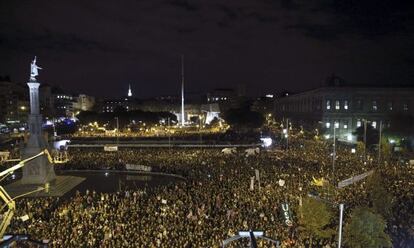Massive anti-government demonstrations cap national strike day
Hundreds of thousands march to reject government’s austerity measures Mossos chief says images of 13-year-old beaten by police "hurt my eyes"

After Spain’s industry and transport systems had been crippled by a 24-hour general strike, which started at midnight on Tuesday, hundreds of thousands of people took to the streets across the country on Wednesday evening. The largest march took place in Madrid, where the CCOO and UGT labor unions said that one million people had thronged the streets around Cibeles square to protest against the government’s austerity measures.
That number was at extreme variance with the official government delegation’s figure of 35,000 protestors in the capital. Using a standardized formula based on photographs and crowd density, EL PAÍS estimates that some 174,000 people took to the streets in Madrid on Wednesday. In Barcelona the central government’s delegation in the Catalan capital came up with the same 35,000 figure as its counterpart in Madrid, while local police said that 110,000 demonstrators had gathered in Gràcia boulevard.
In a separate Madrid protest, the 15-M and 29-S Surround Congress grassroots organizations gathered hundreds of supporters around the parliament building near Cibeles, leading to sporadic clashes between a number of violent protestors and the police. In all, 21 people were arrested with 29 requiring medical treatment, including nine officers.
The unions claimed the strike had been a huge success, citing an adhesion rate of around 65 percent of workers. The government noted that electricity demand had fallen by 12.7 percent compared to a normal weekday in November, while in the previous one-day national strike in March that figure had been 16 percent.
However, the mass rallies appear to have had little effect on the government, or Mariano Rajoy’s road map out of the crisis. The prime minister said in an interview with Argentinean daily La Nación this week that Spain has “no alternative” to swingeing austerity measures.
“There are many people that understand, although evidently there are others who do not, and I respect them. But there are 46 million people in Spain and while there are many who don’t like what we are doing, there are also many that do.”
Speaking on Thursday, Deputy Prime Minister Soraya Sáenz de Santamaría said that “the government listens to the streets but it has to take decisions. Our responsibility is to work so that this country, through the necessary reforms, can return to growth.
“The strike is not going to change government policy. We are in the middle of a painful process but we are on the right track,” said Foreign Minister José Manuel García Margallo.
In Tarragona, the family of a 13-year-old boy who sustained a head injury during a police charge said it planned to take the matter to court. Regional interior chief Felipe Puig blamed the incident on the “momentum” of the sergeant who delivered the blow. The director of the Mossos d’Esquadra, Manel Prat, said on Cadena Ser radio that images of the bleeding youth “hurt my eyes.”
Tu suscripción se está usando en otro dispositivo
¿Quieres añadir otro usuario a tu suscripción?
Si continúas leyendo en este dispositivo, no se podrá leer en el otro.
FlechaTu suscripción se está usando en otro dispositivo y solo puedes acceder a EL PAÍS desde un dispositivo a la vez.
Si quieres compartir tu cuenta, cambia tu suscripción a la modalidad Premium, así podrás añadir otro usuario. Cada uno accederá con su propia cuenta de email, lo que os permitirá personalizar vuestra experiencia en EL PAÍS.
¿Tienes una suscripción de empresa? Accede aquí para contratar más cuentas.
En el caso de no saber quién está usando tu cuenta, te recomendamos cambiar tu contraseña aquí.
Si decides continuar compartiendo tu cuenta, este mensaje se mostrará en tu dispositivo y en el de la otra persona que está usando tu cuenta de forma indefinida, afectando a tu experiencia de lectura. Puedes consultar aquí los términos y condiciones de la suscripción digital.








































